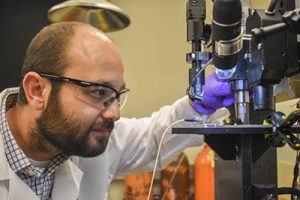
Arda Gozen, assistant professor, WSU School of Mechanical and Materials Engineering. Photo Credit: WSU
Living with any disease isn’t easy. In particular, when it comes to living with diabetes, it involves an imposed routine of finger pricking and monitoring of glucose levels in order to simply maintain a healthy lifestyle. So you can imagine, any technology that can ease the sting is welcomed. Researchers at Washington State University have developed a 3D‑printed glucose biosensor for use in wearable monitors that may forever change how millions monitor their glucose levels.
According to Futurism, the research team—led by Arda Gozen and Yuehe Lin—have developed 3D-printed sensors that could stick to a person’s skin and monitor glucose via bodily fluids, like sweat. The 3D-printed glucose monitor offers much better stability and sensitivity than those manufactured through traditional methods, according to Washington State University. In addition, compared to traditional manufacturing processes, these 3D-printed sensors also cut down costs and reduce waste like expensive cleanroom processing and harmful chemicals.
Using a method called direct-ink-writing (DIW), nozzles are able to create intricate and precise designs at tiny scales, allowing them to print out nanoscale materials that are electrically conductive in order to create flexible electrodes. Researchers found their 3D‑printed sensors did better at picking up glucose signals than the traditionally produced electrodes; they are also more customizable for the variety of people’s biology.
The team is now working to integrate the sensors into a packaged system that can be used as a wearable device for long‑term glucose-monitoring.
Read Gonzen’s and Lin’s earlier paper on the subject, 3D Printed Wearable Glucose Sensors, and more on other biosensor developments on the ECS Digital Library.
The inventor of the painless diabetes blood monitor, Adam Heller, discusses his work on healthcare-related electrochemical products, including his wired glucose oxidase which forms the core of the most advanced, continuous glucose monitoring system for diabetes management, in an ECS Masters video. Heller is a Fellow of The Electrochemical Society and member of the Society since 1973.
Read more on Heller’s work, live on the on the ECS Digital Library.

